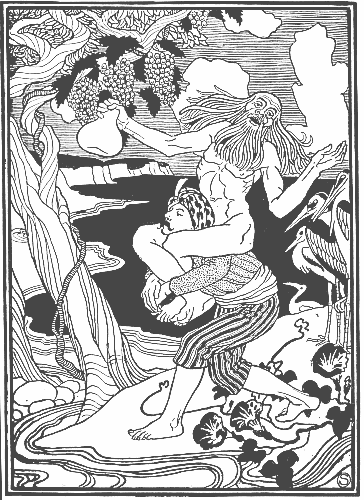But he wasn't.
The Seven Voyages of Sinbad are usually included in the Sheherazade's 1001 Nights, but the Voyages not really folk tales at all, but historical fiction: in them Sinbad's birthplace is clearly stated (Sindh) and the voyages are carefully dated to the reign of Harun el Rashid.
The story of Sinbad begins at the end. A rich man called Sinbad tells a poor man, also called Sinbad, the story of how he got rich.
Sinbad's seven voyages (in the end Sinbad, like Gulliver, finally gets enough sense to stay at home) take Sinbad to a City of Apes, trap him in a vast tomb, shipwreck him almost constantly, and even take him up to heaven. He encounters underwater horses, rocs:

(though I never could believe in the name roc for a giant bird), kings and ogres, and even the terrifying Old Man of the Sea:

Illustration by William Strang.
And as with so many stories, it's the ones you haven't read before that are the very very best.
Word To Use Today: Sinbad. This word is Persian (though the original Persian version of the story has been lost). It means Lord of the Sindh River.
Hint for Use: "Can't you leave me alone for a minute? You're like Sinbad's Old Man of the Sea."
No comments:
Post a Comment
All comments are very welcome, but please make them suitable for The Word Den's family audience.